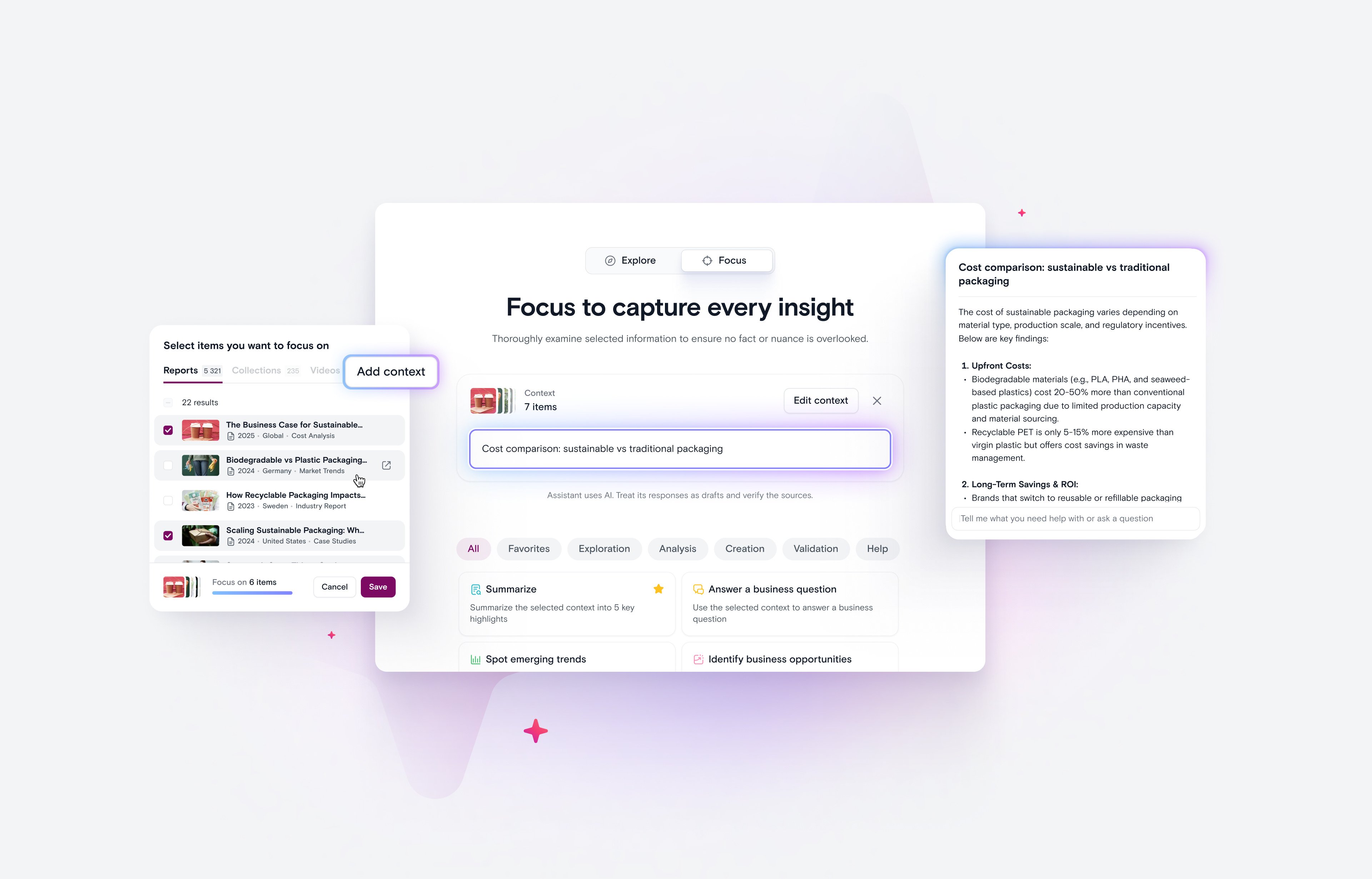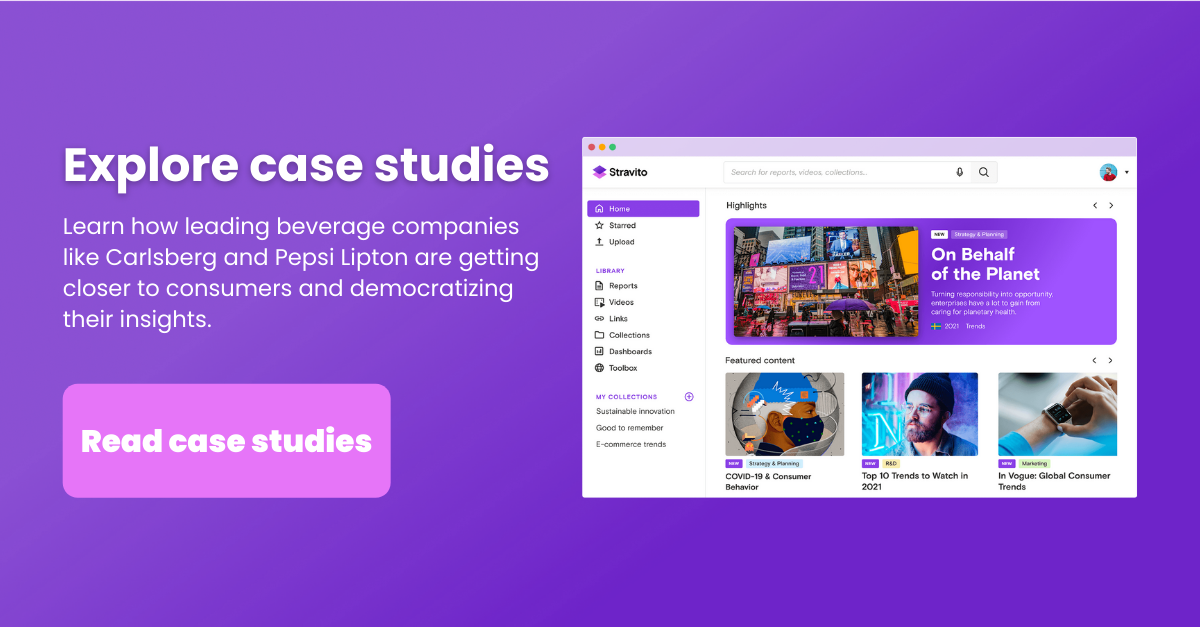How Beverage Companies Can Cultivate Consumer Centricity

It's so important to be close to the consumer - if you’re not, you’re playing a high-risk game.
As illustrated by the quote above, truly understanding customers is at the core of running a successful business. This holds particularly true for fast-moving consumer goods companies, where purchases are frequent, choices are made quickly, and the costs of switching between brands is low.
For beverage companies, the competition is especially stiff. Thirst, the basic human need that consumers are looking to satisfy, is fairly straightforward. But there are a seemingly infinite amount of ways for consumers to quench that thirst, which are driven by a complex constellation of factors.
Creating products that will stand out and be chosen repeatedly by consumers requires a deep understanding of the variables influencing their behavior. However, that deep understanding is just one part of the equation–it’s the ideas that are generated and the decisions that are made after that will make the difference.
This necessary practice of consumer centricity is one that can be quite challenging to implement in organizations, especially if the organization is large, decentralized, or prone to knowledge silos. And it can be difficult to know where to start or what to prioritize.
An excellent way to transform the abstract into the practical is to identify the key elements that need to be in place for a more consumer-centric organization. In the following sections, we’ll explore 3 of these key elements: the role of insights teams, how insights are circulated throughout the organization, and the right technology.
Key element #1: Elevating the role of insights teams
As we touched on before, consumer behavior is complicated. And that’s why it's crucial for insights teams to be a strategic business partner in the organization. Their true expertise lies in carefully analyzing data through a critical yet holistic lens, in order to offer nuanced and actionable interpretations to stakeholders.
But quite often, insights teams are undervalued. In fact, one study found that as many as 80% of companies limit the role of the Consumer Insights function, instead of viewing them as a strategic business partner or a source of competitive advantage. They end up functioning as librarians or an information desk for stakeholders in the organization, answering requests for information or being asked to commission research on specific topics.
This also tends to coincide with insights teams being included only sporadically throughout the stages of projects, helping to affirm decisions that have already been made, rather than being given the opportunity to apply their expertise in a deeper, more meaningful, and more proactive way.
Elevating the role of insights teams ensures that the complexity of human behavior is taken into account when interpreting consumer research, generating higher quality insights for the entire organization.
Key element #2: Democratizing insights in the organization
However, elevating the role of insights teams should absolutely not be confused with the insights team acting as gatekeepers. Because generating quality insights is only one part of the equation; successfully practicing consumer centricity requires those insights to be effectively applied by all teams involved.
For example, recent research shows that consumers are looking for functional, healthier beverages that are also packaged with convenience and sustainability in mind. Applying these insights to business activities requires multidisciplinary effort from R&D, packaging, brand, and marketing. These teams have the expertise to translate such insights into action, by creating healthy beverages that are still delicious, communicating improved sustainability, all while enhancing brand equity.
One beverage company that is excelling in this mission is Carlsberg Group. Their VP of Insights and Analytics, Nick Rich, explains:
At Carlsberg, we believe knowledge should be accessible to all, no matter where in the organization someone is. We all need to understand real people living real life and have access to that information so we can brew today for a better tomorrow.
From our research laboratory and brewery colleagues through to channel sales & partners, this knowledge touches each and every person, even if the end consumer doesn’t know it.
Key element #3: Powerful and supportive technology
Ensuring that insights teams have the time to do deeper work, while also ensuring that the quality insights generated reach the right stakeholders at the right time is no small feat. Without the right technological support, even the best planned consumer centricity initiatives are likely to stall.
Achieving this requires that insights teams and stakeholders alike are able to quickly access all relevant research. This is a challenge for many companies without a dedicated insights management platform; reports end up being lost in inboxes, file drives, or even USB sticks. Not only does this slow down the process of turning insights into action, it also increases the risk that all relevant research isn’t factored into the decision-making process.
Powerful technology like AI and machine learning can help to solve these issues, but it’s crucial that this advanced technology doesn’t come at the expense of usability. Successful consumer centricity is a continuous practice, which means that high, widespread adoption of any supporting technology is key. Otherwise, new initiatives might fizzle out in just a few weeks.
That’s why choosing technology that is both powerful and user-friendly is a key element of an effective consumer centricity strategy. The ideal insights management platform should support your work, rather than distract from it.
The unique opportunity for companies in the beverage industry
By empowering insights teams and organizational stakeholders to leverage their specific sets of expertise, a consistent approach to consumer centricity can be achieved over time. The right technology can support these efforts, removing obstacles and facilitating deeper work.
But practicing consumer centricity doesn’t just offer business benefits. It also gives beverage companies the chance to make a real difference in the world.
With physical and mental health more in focus than ever and the importance of sustainability being made abundantly clear, beverage companies have the unique opportunity to create products that positively impact the health of people and the planet.
Related Content

The Role of AI in Decision-Making: Smarter Insights or Faster Mistakes?
Thor Olof Philogène Apr 3, 2025

To Maximize the Value of Your Research, Start with Knowledge Management
Sarah Wiggins Mar 27, 2025

Stravito Enhances GenAI Assistant to Accelerate Time-to-Insight
Charlotte Hilton Mar 20, 2025
